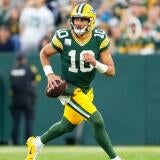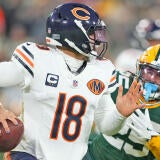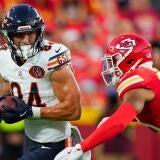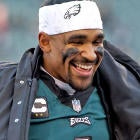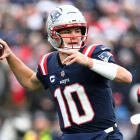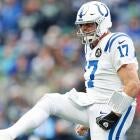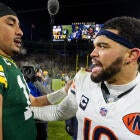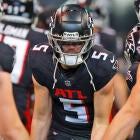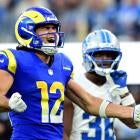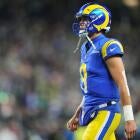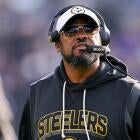Which Eagles Super Bowl team is better? Comparing 2022 lineup to 2017 championship roster
Comparing one team of destiny to another

For the second time in six seasons, the Philadelphia Eagles are in the Super Bowl. Fresh off a rout of the 49ers in the NFC Championship, the Birds have now secured a championship berth in each of the last three decades, previously advancing to the big game in 2004 and 2017. They claimed the Lombardi Trophy their last time out, and this year, they entered the playoffs with a franchise-record 14 regular-season victories.
With that in mind, it's fair to wonder: are the 2022 Eagles actually better than their title-winning predecessors? Of course we don't mean it in the literal sense; until they hoist their own trophy, they are inferior. But what about talent-wise? Are the present-day Birds even more dangerous, with an even more balanced roster? Let's run through the major positions and decide:
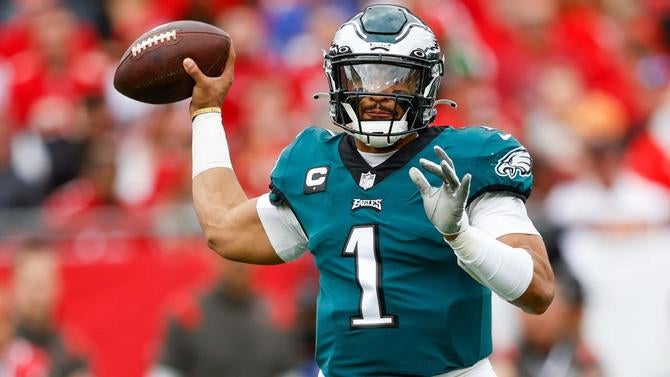
QB
2017: Nick Foles
2022: Jalen Hurts
Replacing an injured Carson Wentz, who was emerging as dynamic MVP candidate at the time, Foles proved to be a historic fill-in, lacking Wentz's athleticism but offering clutch and confident downfield touch. He ultimately went blow for blow with Tom Brady on the biggest stage, in the brightest moments. And yet Hurts, somehow, has been even better than both on the whole, taking the best attributes from each predecessor's game. One of the toughest, most reliable runners at the position, his leaps as a passer this year cannot be overstated. While his aerial usage was muted against a stingy 49ers front in the NFC Championship, he's tended to dish the ball efficiently and accurately at every level.
Edge: 2022

RB
2017: Jay Ajayi, LeGarrette Blount, Corey Clement
2022: Miles Sanders, Kenneth Gainwell, Boston Scott
Ajayi and Blount were a lightning-and-thunder combo, with the former excelling in space and Blount setting the tone with smashmouth size, while Clement chipped in as a feisty pass catcher. Sanders, meanwhile, has exploded as more of a featured back in 2022, ranking among league-leaders in 20+ yard carries and showing improved toughness in tight spaces. Gainwell has also come on late as a high-effort change-of-pace option a la Clement, so it's truly a tossup. The 2017 unit was more of a collective, but behind this year's line, and in conjunction with Hurts, the 2022 backs have arguably been more slippery overall.
Edge: Even

WR
2017: Alshon Jeffery, Torrey Smith, Nelson Agholor, Mack Hollins
2022: A.J. Brown, DeVonta Smith, Quez Watkins, Zach Pascal
In 2017, Jeffery represented a massive upgrade for the Eagles out wide, even though his numbers weren't gaudy; his strength as a possession receiver enabled Torrey Smith to star as a deep threat, with Agholor enjoying a breakout as an energetic safety valve. But there's no denying the 2022 group's star power. Brown is an alpha male in his prime, pairing a monster frame with downfield juice, even though his Eagles playoff debut has been quiet to date. DeVonta Smith, on the other hand, is a pristine route-runner whose slender frame doesn't match his fight and body control, making he and Brown a 1A and 1B pairing.
Edge: 2022

TE
2017: Zach Ertz, Brent Celek, Trey Burton
2022: Dallas Goedert, Jack Stoll, Grant Calcaterra
An all-time Eagle, Ertz was a QB's best friend, always winning on key downs with tight-window catches. Celek, once an unofficial receiver himself, was mostly a blocker as his reserve, but Burton shined in some important spots as well. Goedert is a smoother athlete than all of them, with the potential for Ertz-level impact when healthy, but his production has been a bit more scattershot, partly due to injury and partly due to a superior cast of supporting characters.
Edge: 2017

OL
2017: Halapoulivaati Vaitai, Stefen Wisniewski, Jason Kelce, Brandon Brooks, Lane Johnson
2022: Jordan Mailata, Isaac Seumalo, Jason Kelce, Landon Dickerson, Lane Johnson
This is one of the biggest testaments to general manager Howie Roseman's roster-building: the Eagles consistently win in the trenches. Jason Peters was past his Hall of Fame prime before an injury forced Vaitai into action as 2017's blind-side blocker, but the Kelce-Brooks-Johnson trio on the right side was nearly unbeatable down the stretch, paving the way for both Wentz and Foles to dominate. Mailata is more physically gifted at left tackle today, while Kelce and Johnson remain in All-Pro form, especially when powering the ground game.
Edge: Even

DT
2017: Fletcher Cox, Timmy Jernigan, Beau Allen
2022: Javon Hargrave, Fletcher Cox, Milton Williams, Linval Joseph, Jordan Davis
Cox was one of the game's most disruptive interior men during the 2017 title run, and Jernigan had a career outing as his partner; the two combined for eight sacks, 14 tackles for loss and 25 QB hits. The former is a shell of his former self now, better suited in rotation, but Hargrave has filled the gap as one of the NFL's best pass-rushing tackles. Williams, Joseph and Davis, as well as big-name reserve Ndamukong Suh, all offer a larger-than-life presence against the run up the middle.
Edge: 2022
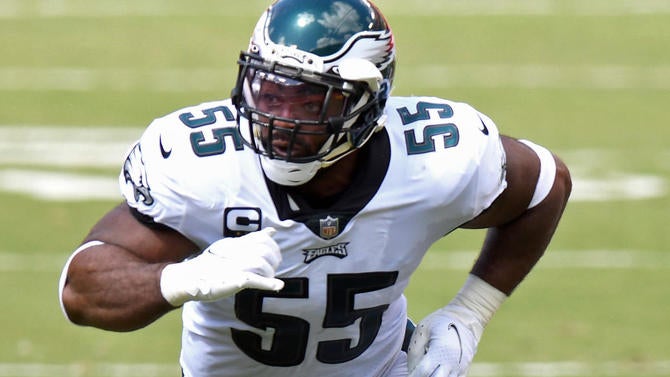
DE/OLB
2017: Brandon Graham, Vinny Curry, Chris Long, Derek Barnett
2022: Haason Reddick, Josh Sweat, Brandon Graham, Robert Quinn
While the 2017 rotation lacked a true home-run hitter, the ageless duo of Graham and Long proved especially effective in the clutch, with the latter excelling as a forced-fumble artist. Barnett was also a much more promising No. 4 than Quinn. But there's more firepower up top this year. Sweat and Graham have teamed up to offer quiet but steady pressure up front, whereas Reddick has been an absolute terror gunning for QBs as a stand-up blitzer. He single-handedly wrecked the 49ers early in the NFC Championship and has shown an incredible knack for knocking the ball loose when he reaches the pocket.
Edge: 2022

LB
2017: Nigel Bradham, Mychal Kendricks, Najee Goode
2022: T.J. Edwards, Kyzir White, Nakobe Dean
Edwards is a hard-nosed tackling machine, and both White and Dean offer athletic upside. But the Eagles' current "D" works mostly because of what happens on the front and back ends. Bradham, on the other hand, brought a lot of physicality and personality to the bend-but-don't-break championship group. Jordan Hicks was instinctive before going down, and Kendricks, though deployed in limited fashion, did his job in a sort of post-benched revival.
Edge: 2017
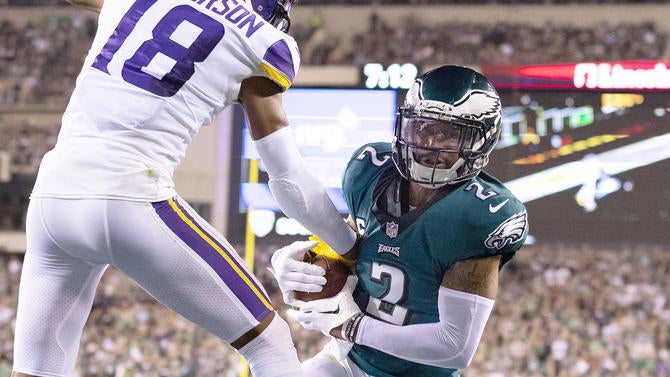
CB
2017: Ronald Darby, Jalen Mills, Patrick Robinson, Rasul Douglas
2022: Darius Slay, James Bradberry, Avonte Maddox, Josiah Scott
Both Darby and Mills were prone to surrendering deep balls, but the former had plenty of play speed, and the latter had unmatched confidence, playing bigger than his size suggested. Robinson was 2017's X-factor, leading the club in picks as a surprise slot star. Slay and Bradberry are a bona fide shutdown duo, however; they aren't elite ballhawks and differ in personality -- Slay is the colorful character, Bradberry the quiet lurking presence -- but both excel at getting handsy on tight throws. Maddox, meanwhile, has proven sticky in coverage from the slot when healthy.
Edge: 2022

S
2017: Malcolm Jenkins, Rodney McLeod, Corey Graham
2022: C.J. Gardner-Johnson, Marcus Epps, Reed Blankenship
Jenkins was one of the heartbeats of the 2017 title run, not only for his vocal smarts and leadership but rangy versatility; in a single series, he'd go from run-stopper to slot corner to center fielder, doing all the jobs well. McLeod was the hard-hitting sidekick, and Graham fared well as a deep cover man. Gardner-Johnson, following in Jenkins' footsteps as a Saint-turned-Eagle, has been one of the NFL's top pick artists when healthy. But his companions are more serviceable than special.
Edge: 2017
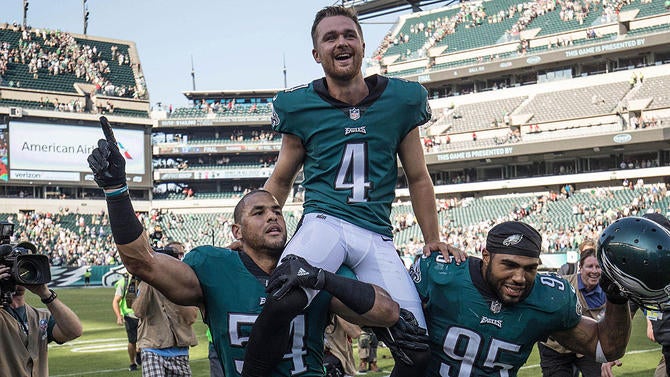
STs
2017: Jake Elliott (K), Donnie Jones (P), Kenjon Barner (KR/PR)
2022: Jake Elliott (K), Brett Kern (P), Britain Covey (KR/PR)
Jones was more consistent as a punter for the 2017 group, averaging 45.3 yards per kick while dropping 21 punts inside opponents' 20-yard line. But Elliott is just as, if not more, trustworthy than he was then. And that's saying something, considering he had a little spark of destiny in his leg as a rookie, when he went 5 for 6 on 50+ yard field goals, including a game-winning 61-yarder. Five years later, he's been equally as good on 50+ yarders, and remains perfect on postseason field goal tries.
Edge: Even
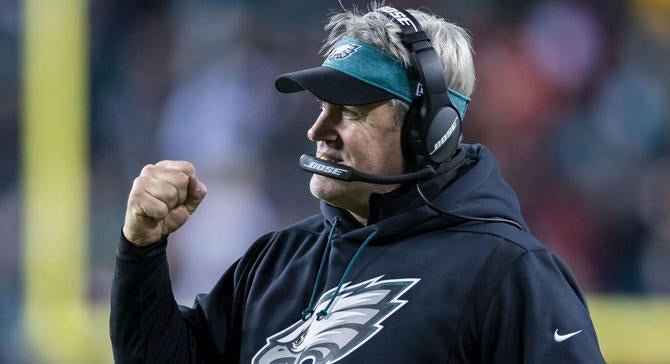
Coaching
2017: Doug Pederson (HC), Frank Reich (OC), Jim Schwartz (DC)
2022: Nick Sirianni (HC), Shane Steichen (OC), Jonathan Gannon (DC)
Sirianni brings the requisite Philly-esque spunk to the sidelines, and he and Steichen have truly unlocked Hurts as an apparent face of the franchise, not to mention made traditionally aggressive decisions look both casual and obvious. But Pederson and Reich were ahead of the curve in 2017, proving more bold and creative than most offensive minds of that time, especially considering how seamlessly they adapted to serious injuries at QB and across the lineup. Gannon, like Schwartz, hasn't led a wholly suffocating defense as opposed to one that relies on front-four production without exotic blitzes, plus timely takeaways, making this a truly close comparison. Still, how can you top the "underdogs" of the Super Bowl-winning staff?
Edge: 2017
The final verdict
2017 advantages: 4
2022 advantages: 5
Even: 3
There you have it. It's a close call, as expected, but across the board, the 2022 Eagles boast slightly more talent atop the depth chart, in our eyes. Again, the 2017 group cannot be topped in the history books without another Lombardi Trophy. Frankly, it's also hard to quantify the spirit of that team -- a team almost unanimously left for dead, only to upset the Patriots dynasty for Philly's first-ever Super Bowl crown. But rest assured, if you're part of the Eagles faithful, that Philly enters Super Bowl LVII with comparable championship-level potential. We don't yet know if destiny is truly on their side, but position-by-position, it's hard not to like their chances as a legitimate contender. They made it this far because of premium production at premium positions -- QB, up front, out wide and off the edges -- and like the 2017 team, they're hitting the biggest stage on a high note.



